Welcome to WordPress. This is your first post. Edit or delete it, then start writing!
Jack Haggerty
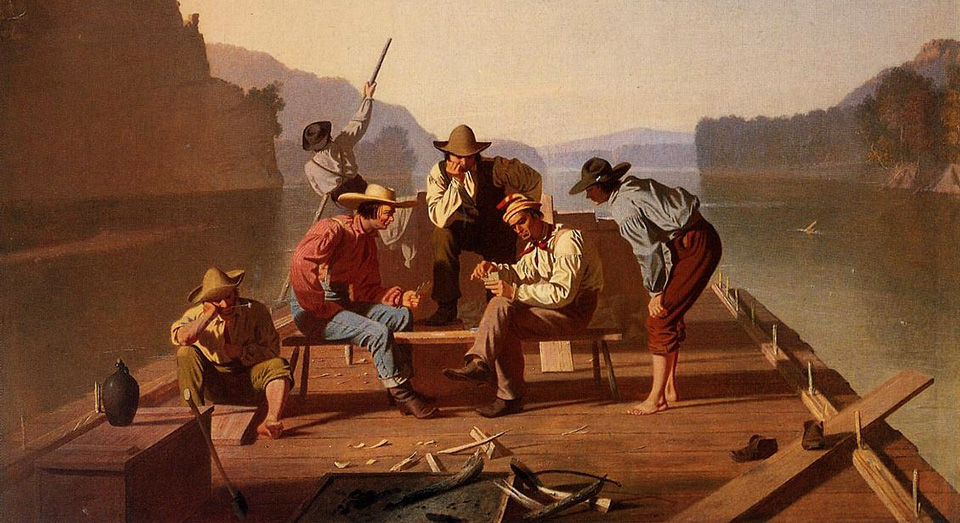
A FELLOW BY THE NAME OF DAN McGINNIS wrote the lyrics to take the piss out of his boss, George Mercier. Old George was engaged to Anna Tucker, and managed to land a job that McGinnis wanted. In spite, McGinnis wrote the lyrics, and tagged Jack Haggerty’s name on it, some think to make George wonder if there might have been a bit of a dalliance between Jack, who was the local heartthrob, and Anna.
We know all of this because a woman by the name of Geraldine Chickering did the research. A thousand thanks to her for bringing a tale of river life from the Flat River in Minnesota into focus. We stole it from Touchstone, a mix of American and Irish musicians.
Jack Haggerty
Dan McGinnis, Minnesota, Nineteenth Century
I’m a heartbroken raftsman, from Greenville I came
All my virtue’s departed with a lass I did fain
From the strong darts of Cupid I’ve suffered much grief
And my heart’s broke asunder, I can get no relief.
Of my trouble I’ll tell you without much delay
Of a sweet little lassie my heart stole away
She’s a blacksmith’s fair daughter from the flat river side
And I always intended to make her my bride.
I work on the river where the white waters roar
And my name I’ve engraved on the high rocky shore
I’m the boy that stands happy on the dark, burling stream
But my thoughts were on Molly, she haunted my dream.
I gave her fine jewels, the finest of lace
And the costliest muslins, her form to embrace
I gave her my wages all for to keep safe
I deprived her of nothing I had on this earth.
While I worked on the river, I earned quite a stake
I was steadfast and steady, and ne’er played the rake
For Camp Flat and river I’m very well known
And they call me Jack Haggerty, the pride of the town.
Till she wrote me a letter, which I did receive
And she said from her promise herself she’d relieve
For to wed to another she’d a long time delayed
And the next time I’d see her she’d no more be a maid.
To her mother, Jane Tucker, I lay all the blame
For she caused her to leave and go back on my name
For to cast off the riggings that God was to tie
And to leave me a rambler ’til the day that I die
So come all ye bold raftsmen with hearts stout and true
Don’t trust to a woman ’cause you’re beat if you do
And if you do meet one with a dark chestnut curl
Remember Jack Haggerty and the Flat River girl!
On Springfield Mountain
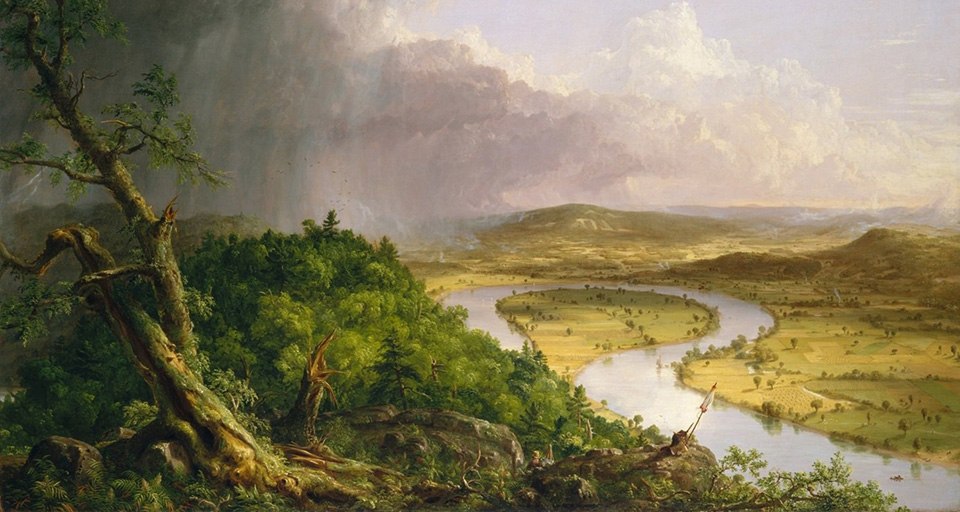
IT’S A TRAGIC TALE … telling of the death of one Timothy Merrick, who died on August 7, 1761 in Wilbraham, Massachusetts from the bite of a serpent. The town clerk recorded at the time, “Lieut Thomas Mirick’s only Son dyed, August 7th, 1761, By the Bite of a Ratle Snake, Being 22 years, two months and three days old, and very nigh marridge.”
And that’s pretty much where the facts ends and the story begins. Somehow over time, an alternate tradition far removed from the tragic nature of the tale developed. Woody Guthrie did a totally bizarre version, and over time the song has developed into a rather long tale with a pun of a punch line.
Perhaps it shows that back then, people laughed in the face of tragedy. Or perhaps it only shows that nothing can keep a bad joke down.
On Springfield Mountain
Traditional, United States, Eighteenth Century
On Springfield Mountain there did dwell
A lovely youth I knowed him well.
This lovely youth one day did go
Down to the meadom for to mow.
He scarce had mowed quite round the field
When a cruel serpent bit his heel.
They took him home to molly dear
Which made him feel so very queer.
Now Molly had two ruby lips
With which the poison she did sip.
Now Molly had a rotting tooth,
And so the poison killed them both.
Nineteen Years Old (The Virgin)
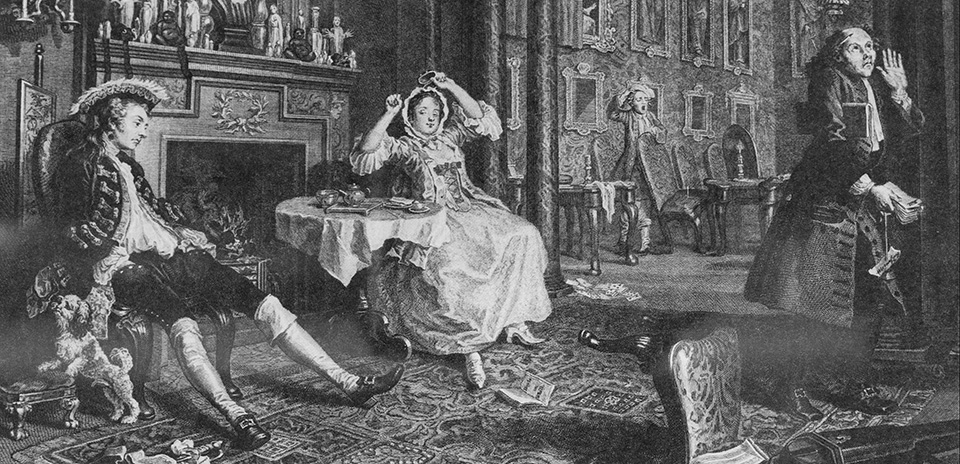
ON THE FRONTIER THERE WERE NO STANDUP COMEDIANS. They were forced to make each other laugh. When it comes to topics, we haven’t progressed much as this song shows.
Variations exist of this song under a number of names, including In the Shade of the Old Apple Tree, The Burgler Man, My Little Girl, A Dandy For Nineteen Years Old and Whorehouse Bells Were Ringing.
This one goes out to anyone who has ever been on an online dating site. Buyer beware. It dates from the eighteenth century, was English in origin and became increasingly obnoxious once it hit these shores. There are versions where the lady in questions strips down till the only thing remaining is her um … well you get the point.
Nineteen Years Old (The Virgin)
Traditional, England, Nineteenth Century
As I was walking down by the Strand
I met a young lady all dressed up so grand
With features of finery and jewels set in gold
Said she was a maiden, just nineteen years old
Her fingers were tapered, her neck like a swan
Her head tipped a little, her voice not too strong
In six weeks we were married, the wedding bells tolled
I’d married that maiden, just nineteen years old
After the wedding we retired to rest
I thought I would die when that female undressed
A trunk full of cotton she first did unload
I thought it darned funny for a nineteen year old
She took off her left leg as high as her knee
She took off her fingers, I countered but three
While there on the carpet her glass eye did roll
I thought it darned funny for a nineteen year old
She took off her eyebrows, I thought I would faint
Next from her mug came a carload of paint
She took off her false wig, her old bald head told
I thought it peculiar for a nineteen year old
She took out her teeth, I jumped up in terror
Her chin and her nose fell right in together
Now I’m telling you folks she was a sight to behold
That fair little maiden just nineteen years old
Now all you young fella’s when courting you go
Make sure she is perfect from head to her toe
You’ll pay for your folly, like mine you you’ll be sold
To a patched up old maid about ninety years old
I Courted A Wee Girl (The False Bride)
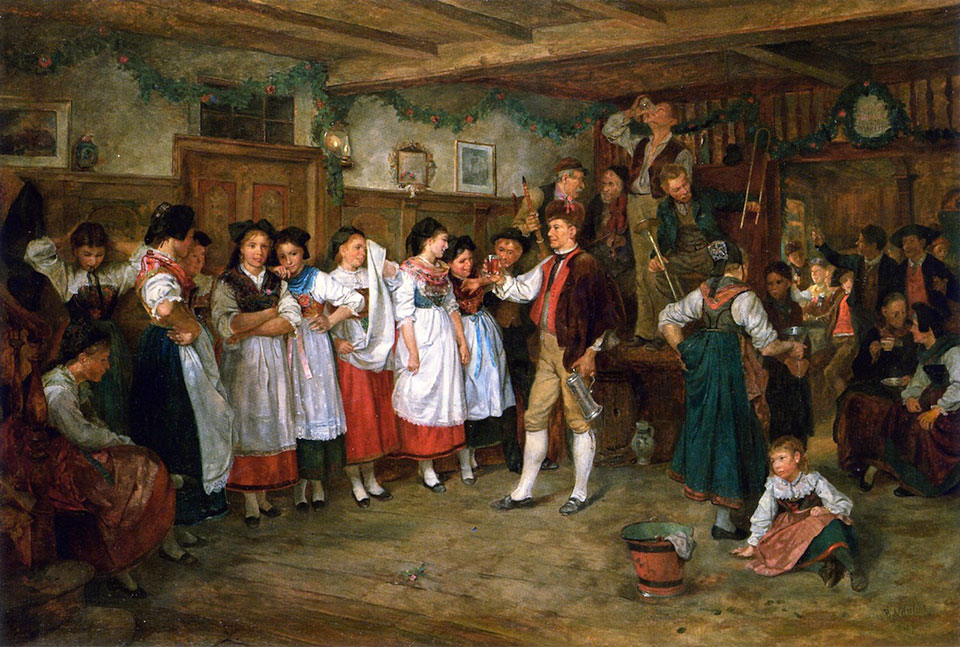
I Courted A Wee Girl is a heartbreaking tale, Scottish in origin though the Irish lay claim as well. The Brits made it popular as a broadside ballad. It’s also known as “The False Bride,” “The Week Before Easter”, “The False Hearted Lover”, “The Forsaken Bridegroom” or “Love Is The Cause Of My Mourning” or “The False Nymph”.
I Courted A Wee Girl
I courted a wee girl for many’s the long day,
And slighted all others who came in my way.
But now she’s rewarded me to the last day;
She’s gone to be wed to another.
The bride and bride’s party to church they did go.
The bride she rode foremost she put the best show
And I rode behind, my heart filled with woe
To see my love wed to another.
The bride and bride’s party, in church they did stand,
Gold rings on their fingers, a love hand in hand
The man that she’s wed to has houses and land—
He may have her since I could not gain her.
The last time I saw her she was all dressed in white;
The more I gazed on her she dazzled my sight,
So I tipped her my hat and bade her goodnight.
Here’s bad luck to all false-hearted lovers
So dig me a grave and dig it down deep,
And strew it all over with primrose so sweet.
And lay me down in it for no more for to weep,
For love was the cause of my ruin.
Fair Fannie Moore
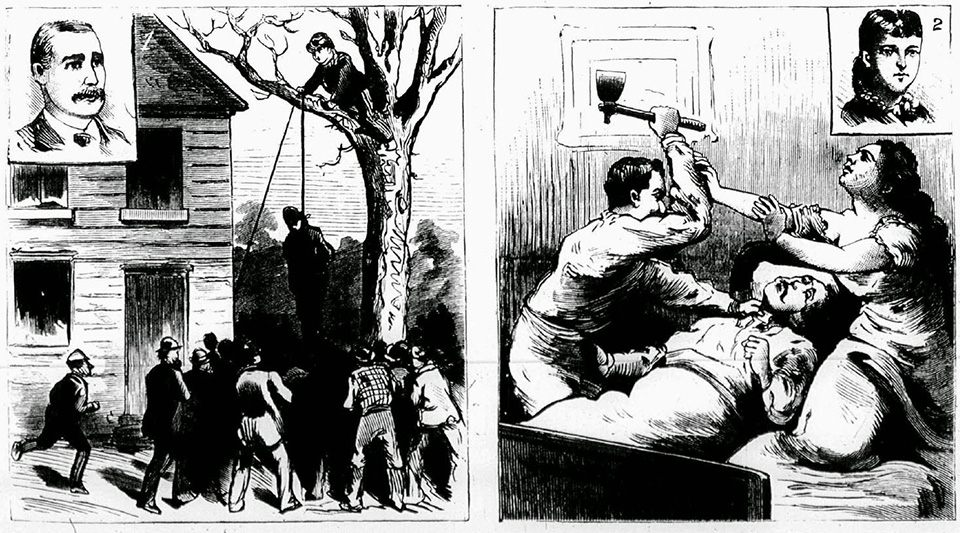
It found its way to us via an album titled Green Fields Of Illinois, put out by the Campus Folksong Club of the University of Illinois in 1963. The album was a collection of folk songs sung by regular folks who hailed from southern Illinois, so it’s possible at least, that at the time of our fair city’s founding it was already a part of the musical repertoire of the area.
HERE’S A NEWFOUNDLAND VERSION of a British murder ballad, which drifted its way all over North America, and found some success later on as a cowboy song.
Fair Fanny Moore
Traditional, origin and date unknown
Down in yonder cottage all forsaken and alone,
Its paths all neglected, with grass overgrown;
Look in and you will see some dark stains upon the floor,
They say it is the blood of the fair Fanny Moore.
To Fanny so blooming two lovers there came,
One offered to Fanny his wealth and his fame;
But neither his houses nor his lands could secure
A place in the heart of the fair Fanny Moore.
The first was young Randal so bold and so proud,
He to the young Fanny his haughty head bowed;
But neither his gold nor his silver could secure
A place in the heart of the fair Fanny Moore.
The next was young Henry of the lowest degree,
He gained her fond heart and in rapture was he;
That night at the altar he was bound for to secure
A place in the heart of the fair Fanny Moore.
As Fanny was sitting in her cottage one day,
And business had called her fond husband away,
Young Randal so haughty came in at the door,
And clasped in his arms the fair Fanny Moore.
Saying, Fanny, oh Fanny, reflect on your fate,
And grant me one favour before it’s too late;
For there is one thing I am bound for to secure,
The love or the life of the fair Fanny Moore.”
“Spare me, oh spare me,” the fair Fanny cried,
While the tears swiftly flowed from her beautiful eyes.
“Go,” said her traitor, “to the land of thy rest.”
And he buried his knife in her snowy-white breast.
Fanny so blooming in her bloody beauty died,
Young Randal was taken, found guilty and tried.
At length he was hung on a tree in front the door,
For shedding the blood of the fair Fanny Moore.
Young Henry the shepherd he ran ‘stracted and wild,
And wandered away from his own native isle;
At length struck by death he was brought to the shore,
And laid by the side of the fair Fanny Moore.
